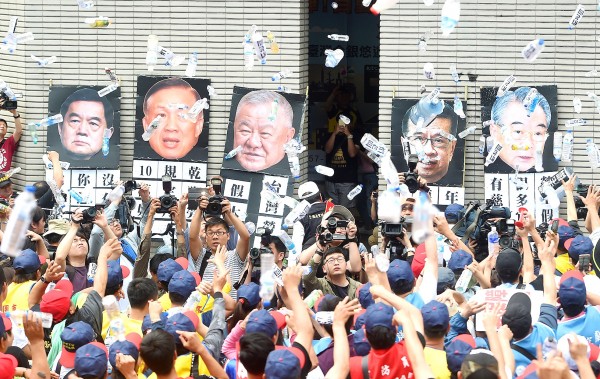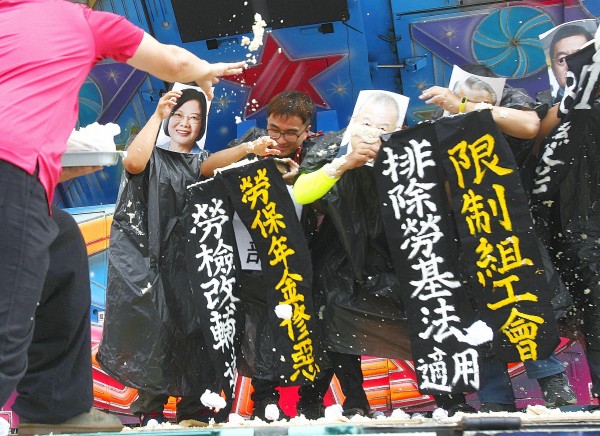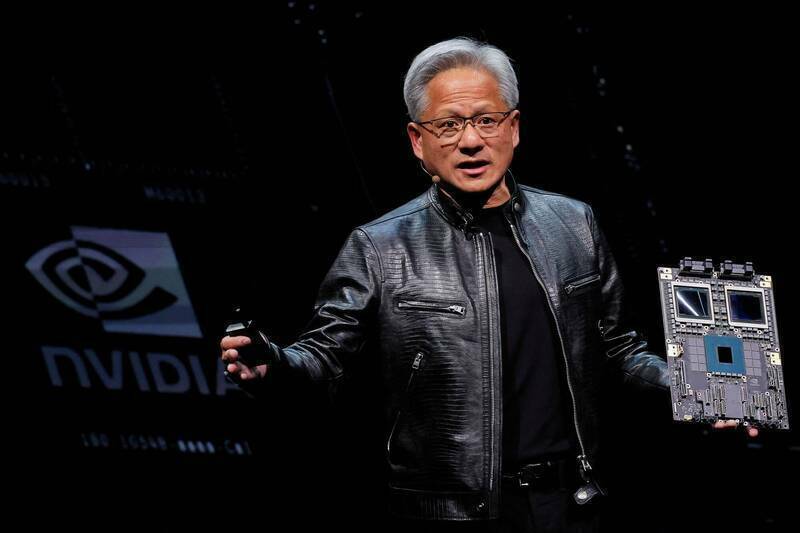《TAIPEI TIMES 焦點》Thousands march in Taipei, Kaohsiung

Protesters hurl empty water bottles at placards with photographs of prominent business leaders, including Far Eastern Group chairman Douglas Hsu, left, during a Workers’ Day rally yesterday in Taipei’s Daan District. Photo: Liao Chen-huei, Taipei Times
NORTH AND SOUTH: Protesters outside the Presidential Southern Office listed five demands to improve workers’ rights and threatened to hold more demonstrations
By Abraham Gerber / Staff reporter
About 10,000 union members and others yesterday marched through Taipei to protest against exploitation and demanding minimum pension guarantees, while a smaller protest was held in Kaohsiung.
The march in Taipei began after a rally on Ketagalan Boulevard, organized by the “2017 May 1 Action Alliance.”
At the marchers’ final stop — the headquarters of the Chinese National Federation of Industries — angry protesters threw empty water bottles at placards bearing images of prominent industrial leaders such as Far Eastern Group (遠東集團) chairman Douglas Hsu (徐旭東), calling them “spoiled bosses” responsible for the erosion of labor rights.
The General Chamber of Commerce’s building was also targeted.
It was the first time the headquarters of the federation and the chamber were targeted by the Workers’ Day protest march, which was first held in 2009.
Taoyuan Confederation of Trade Unions chairman Chuang Fu-kai (莊福凱), one of the directors of the march, said protesters were opposed to further amendments to the Labor Standards Act (勞動基準法) following last year’s changes.
“Even though our overtime and time off have increased a little bit, the price was seven national holidays,” he said, criticizing industry proposals to amend the law to reduce the impact of stricter overtime standards passed last year.
“The act keeps getting worse with every amendment, so we are here to tell off these businesspeople,” he said.
Minister of Labor Lin Mei-chu (林美珠) said a revision of the Labor Standards Act is possible after a “grace period” before full enforcement of the overtime standards expires at the end of next month.
All the legislative caucuses except the Democratic Progressive Party (DPP) sent a legislator to address the marchers.
Chinese Nationalist Party (KMT) Legislator Lee Yen-hsiu (李彥秀), who is a co-convener of the Social Welfare and Environmental Affairs Committee, promised to cooperate with campaigners in arranging meeting agendas and apologized for what she called the KMT’s “incomplete thinking” in the past.
The KMT sponsored the stricter overtime proposals that reduced the number of national holidays.
However, Lee avoided a question about whether the KMT would propose new amendments, instead calling for the Executive Yuan to conduct a full assessment.
She also called for a minimum benefit below which workers’ pensions would not be affected by national pension reforms, echoing protesters’ demands for a guaranteed pension.
“The government should expand corporate tax revenue to fill in the gap between workers’ pensions and the minimum wage to provide retirees with a guaranteed basic living,” said Taoyuan Confederation of Trade Unions secretary Ye Ching-yu (葉瑾瑜), one of several demonstrators who took part in a march from Kaoshsiung to Taipei over the past several weeks to raise awareness of the issue.
In Kaohsiung, hundreds of workers representing 11 labor rights groups protested at the Presidential Southern Office, which President Tsai Ing-wen (蔡英文) inaugurated on March 10.
The protesters listed five demands that they said would advance workers’ rights and submitted a petition to the office.
They said they hoped that Kaohsiung could become a role model for workers.
The protesters called for relocating the Ministry of Labor to Kaohsiung, establishing disciplinary committees in different regions to address inappropriate labor practices nationwide; drafting a basic pension scheme with a floor of NT$16,000; having labor representatives serve as members on listed companies’ boards of directors; and ending the use of dispatch workers.
They also said that Dec. 25 next year should be designated as a “zero dispatch day” to mark the end of the unfair practice.
Simon Chang (張緒中), head of the Kaohsiung-based Independent Federation of Labor Unions, said southern Taiwan is home to millions of workers, and since Kaohsiung has a high percentage of them, the unions decided to stage their protest in Kaohsiung this year instead of Taipei.
“We hope that the changes can be made first in Kaohsiung, because such policies will help increase Kaohsiung workers’ purchasing power and boost the city’s economic development,” Chang said.
The central government must give a clear response to the protesters’ demands within a month or it could face further demonstrations, he said.
Additional reporting by CNA
新聞來源:TAIPEI TIMES

Workers throw bean curd at performers portraying President Tsai Ing-wen and other officials during a Workers’ Day rally in Taipei yesterday. The posters read: “Restrictions on setting up labor unions” and “Inadequate basic labor laws. ” Photo: Chiang Ying-ying, AP

















